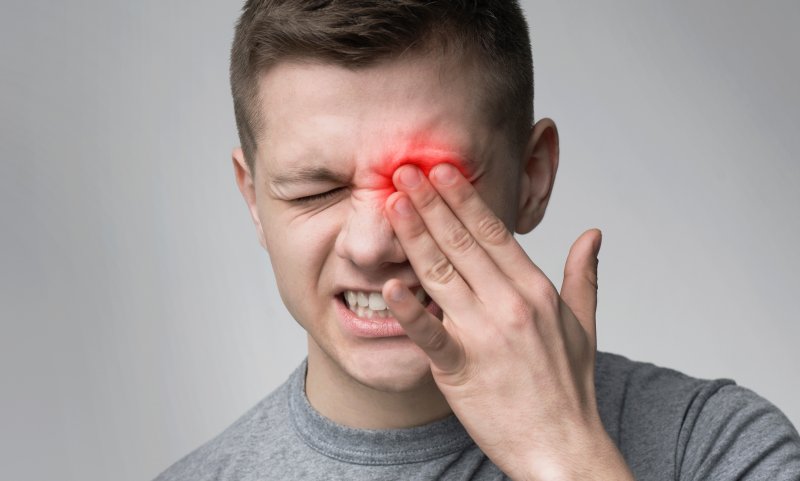
You wake up in the morning and notice that your jaw is sore. You find it hard to open and close your mouth, but you suddenly also discover that you are experiencing serious eye pain. Could there be a connection that you’re unaware of? In this article, a dentist explains the link between eye pain and TMD, what you can do to alleviate the discomfort, and how an expert can help to address issues associated with your jaw.
Can TMD Cause Eye Pain?
Yes, TMD (temporomandibular joint dysfunction) can create pain that radiates behind and around the eyes. Although it might seem impossible for discomfort that forms along the jawline to negatively affect these sockets, it can and often does.
The reason this occurs is nerve compression. How does this happen? Temporalis muscles as they are known, are part of the jaw structure and sit behind the eye sockets. When inflammation or trauma occurs in the joints, it can impact these muscles and lead to increased tension and pain that forms and radiates throughout various parts of the head, resulting in headaches, a stiff neck, and even eye pain.
It’s also not uncommon to experience blurry vision, sensitivity to light, and eyestrain as a result of TMD.
When Should You See a Dentist?
Although you might hope that the pain will go away on its own, it will not, and untreated TMD can lead to more serious symptoms and increasing pain.
Should you start to notice greater discomfort when attempting to open and close your mouth, popping or clicking of your jaw joints, or consistent eye pain, don’t wait to see your dentist. Instead, call to schedule an appointment right away.
What Can a Dentist or Doctor Do to Improve TMD?
The type of treatment that will be recommended for TMD will ultimately depend on the cause. For some patients, it may be a misaligned bite that needs to be fixed. This can be accomplished with orthodontic intervention. Whether you opt for metal braces or clear aligners is up to you, but it will help to move your bite into a better position so that the tension is no longer on your jaw joints or muscles.
If TMD is the result of teeth grinding or clenching, a custom-made nightguard can be created to alleviate pressure and create a barrier between the upper and lower arches of teeth.
In more serious situations where the disc, the small piece of cushion between joints, slips out of place, it may be necessary to undergo surgery to fix the issue.
Jaw pain no longer has to leave you feeling as if you are unable to see. With tested and proven effective solutions offered by a skilled dentist or doctor, you can begin to live life without the fear of constant pain.
About the Author
Dr. Michael Michel completed his Doctor of Dental Surgery at the University of Missouri-Kansas City School of Dentistry. After opening his first dental office in 1981, he continues to provide exceptional services to individuals suffering from TMJ, TMD, and sleep apnea. When chronic jaw begins to impact a person’s ability to see and conduct normal daily tasks, he can recommend beneficial treatment options that will not only target pain and inflammation but improve one’s quality of life. Visit our website or call (785) 273-0802 to learn how we can help.
